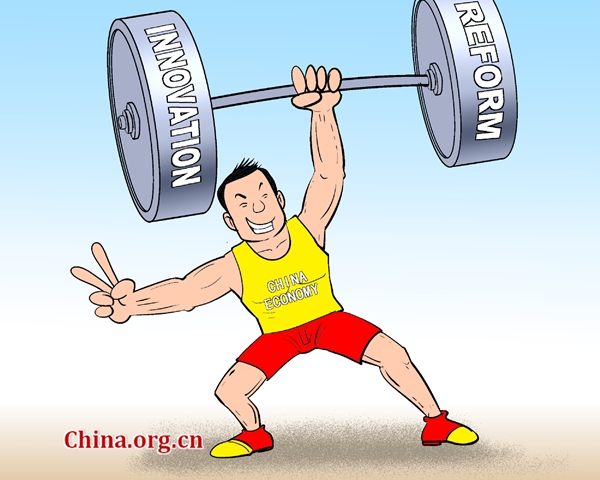Pessimism over China's economy overstated
- By Guo Yiming
 0 Comment(s)
0 Comment(s) Print
Print E-mail China.org.cn, March 16, 2016
E-mail China.org.cn, March 16, 2016
|
|
|
From economists and policymakers, to entrepreneurs and lawmakers, Chinese elites are refuting western predictions of China's"economic collapse" and mulling policy prescriptions to ride through challenges, during the annual sessions of both the NPC and CPPCC. |
Pessimistic predictions of China's economic future have been making headlines since last year, as the world continues to watch whether the second largest economy is losing steam amid lackluster economic data and a gloomy global outlook.
The topic has also drawn heated discussion in the country's annual sessions of its top legislature and political advisory body, in early March.
From economists and policymakers, to entrepreneurs and lawmakers, Chinese elites agree that a possible hard-landing, which was predicted by the likes of billionaire investor George Soros, is overstated and clouds the silver lining of the powerhouse's huge potential to deliver a "new normal" economy.
In response to Moody's downgrade of its outlook on the country's sovereign bonds and wide skepticism over China's stabilized growth, Xu Shaoshi, China's top economic planner, reassured the public that the prospect of a hard landing will not occur and that China's economy is resilient enough to resist downside risks.
"China is capable of keeping economic growth rate within a reasonable range," said Xu, who is also chief of the National Development and Reform Commission, on the sidelines of the annual sessions of the NPC and CPPCC."We are fully confident in our development prospects."
In his 2016 government work report, Premier Li Keqiang revealed that China's growth rate will be targeted to a range of 6.5 to 7 percent, after the country revealed its lowest growth rate in 25 years at 6.9 percent throughout 2015.
Xu noted that China has the capacity to broker growth at a reasonable range, citing that the country boasts a rich material basis, huge market demand, ample room for regional development and profound experience in macroeconomic strategy.
"China is undergoing structural reforms, which are bound to witness the restructuring of a few sectors with overcapacity. However, the trend of China's economy will be to progress and improve steadily," said Li Yining, honorary dean of the Guanghua School of Management at Peking University.
He viewed that the world's second largest economy is transforming from a trend of industrialization to post-industrialization, at a period of time when it is normal to see a few indicators of slowdown in its economy.
Foreign remarks regarding China's "economic collapse" should not be misinterpreted against the general picture of the upbeat performance after several rounds of structural reforms, said Jia Kang, a senior economist and political advisor. He insisted that China still has "ample weapons in its arsenal" to broker a sound and stabilized growth.
On Feb. 29, the People's Bank of China (PBOC) announced it will reduce the reserve requirement ratio for banks by 0.5 percentage points, the first such operation in China during 2016.
"Stabilized growth is gathering momentum as several rounds of interest and bank reserve cuts are producing desirable results," he said, adding that the PBOC's move signaled additional, bold pro-growth measures on the horizon amid economic overhauls.







Go to Forum >>0 Comment(s)